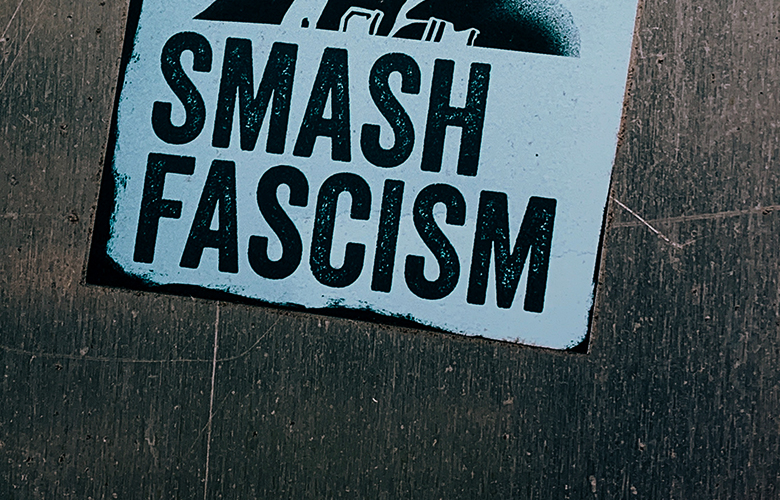
“So what, who cares,” said the apathetic sophomore linebacker lounging in the back of my intro to Theatre class, “The Nazis who took Anne Frank away probably went to the theatre that same night.” That evening, I watched Real Time with Bill Maher. Bill’s panel included the sardonic intellectual Fran Lebowitz who, to my shock, echoed the lounging footballer’s sentiment by saying, “Culture cannot make up for a society.”
We now live in a fascist country. I’m using the economic definition of the word fascism where social Darwinists dominate, and the federal government primarily serves the interests of big corporations. Economist, philosopher, and historian Karl Polanyi wrote that fascism reduces people to the point where “only the economic life remains.” (The New Yorker, May 14, 2018). Fascism does the same to universities – it turns students, professors, and classes into commodities.
The following week an administrator at my CEO-run, factory-style university ordered all Humanities professors to write an “impact statement” identifying how our teaching “benefits the financial needs” of the state. Our statement was to “show accountability and demonstrate a return on the state’s investment.”
How did learning about Impressionism inspire a nursing student’s creativity just enough so that, twenty years from now, he invents a new invention based on an invention that hasn’t yet been invented? How did performing in a beginning acting class give a math major just enough empathy to connect with a son she hasn’t yet conceived of conceiving? Did the student dancing under the snowflakes in Nutcracker gain a deeper understanding of snow? And how do we convert these experiences into dollars?
My impact statement pointed out that the arts do lead to “clear career pathways” (I used the administration’s lingo to try and win them over), that in fact the arts contribute over $760 billion to the U.S. economy – more than agriculture or transportation – and employ nearly 4.9 million people (according to the National Endowment for the Arts website). My statement had no impact. A month later the administration announced that they were cutting back on arts and humanities classes. The new battle cry was STEM. It soon occurred to me that the administration’s desire for classes that teach “job-specific skills” was not the problem, it went much deeper.
The Poet John Ashbery said: “I don’t want to read something I already know, or which is going to slide down easily: there has to be some crunch…” (The Writer’s Almanac, July 28, 2014). Today we live in a dangerously crunch-free culture. Google and Facebook algorithms feed our “self” back to our “self,” while the partisan news fragments us into like-minded tribes. Our fragmented society is also propagated by the arts and humanities.
The nonfiction writer Verlyn Klinkenborg wrote:
“Studying the humanities should be like standing among colleagues and students on the open deck of a ship moving along the endless coastline of human experience. Instead, now it feels as though people have retreated to tiny cabins in the bowels of the ship, from which they peep out on a small fragment of what may be a coastline or a fog bank…” (New York Times, June 22, 2013).
This was what I was doing with my intro to theatre class, peering out on foggy fragments.
Today many Humanities classes are not about that “coastline” but micro-focused on identity. In his book Irrationality, Justin E. H. Smith writes, “At present, the preoccupation with identity that has taken over social media and much of academia… is demanding of us, in ever more strident terms, that we remain within the ever-shrinking boundaries of our narrow public identities, and that we acknowledge no community, no shared life, with those with whom we are not deemed to intersect sufficiently closely.” (Pg. 226)

Recently a colleague of mine, a playwriting professor, referred to his graduate seminar as a “Me” class because the students only wanted to write about their particular life. Not that I condemn this, I’ve written my share of plays about my troubled relationship with my father. But then my colleague went on to say that the students were only interested in sharing their stories with those who empathize with them. When he tried to give notes, a standard reply was, “you can’t understand my play because you are not (fill in an identity).” Brie Loskota, the director of the Center for Religion and Civic Culture at USC, said, “Love that’s reserved only for people who agree with you isn’t love. It’s narcissism.” (Don’t Label Me, by Irshad Manji, pg. 31).
Can you imagine if as a theatre major the university required you to take a math class that applied only to the building of coal-fired power plants and nothing else? You too might (as math majors do with theatre classes) wonder how this applies to you? How is this class going to help you find a job and pay off your massive student debt? I’m not saying arts and humanities cannot zoom in on narrow topics, particular authors, or singular cultures, but professors and writers should then zoom out and apply the lessons to the “endless coastline of human experience.”
To transform, after you zoom in, you must zoom out so that various identities can see themselves in each other, for only when the professor or artist zooms out can they transform the unwoken, the uninformed, the unlike you.
We are in the midst of a cultural revolution that has succeeded in dividing us into warring camps dominated by groupthink. In this hostile environment, it’s only natural that one faction attempts to censor the other. That’s why those in power (the fascists) are slowly choking the arts and humanities. They do not see us as teachers of the human experience, but enemies who are running Maoist-like reeducation camps. They see us as we see Fox News: narrow, partisan, and polarizing. If the shoe were on the other foot, we certainly would be cutting their funding.
After over twenty years as an Arts and Humanities professor, I know only two things to be true about teaching: One: PowerPoint is a sleep aid. Two: The Arts and Humanities need crunch, they should challenge us, but they should also be a bridge that blurs the line between where you end, and others begin. Only if we blur those lines can the arts and humanities recover.
The new mantra that I say before I enter my class or write a play is, “how can I make my story apply to as many humans as humanly possible?” If I succeed, it will be easy for football players or administrators or Fran Lebowitz to answer the questions, “So what? Who cares?”
Ivanka Trump vs Konstantin Stanislavski


William Missouri Downs has had 150 productions of his plays from the Kennedy Center to the San Diego Rep and won numerous playwriting awards including two rolling premieres from the National New Play Network. He’s twice been a finalist at the Eugene O’Neill. He’s published four books on playwriting, screenwriting and the art of theatre. Samuel French and Playscripts have published his plays. He’s also been produced in Spain, South Africa, Singapore, Switzerland, Austria, Israel, India, Russia, and South Korea. In addition he has written for several NBC sitcoms.
Read Full Profile© 2021 TheatreArtLife. All rights reserved.

Thank you so much for reading, but you have now reached your free article limit for this month.
Our contributors are currently writing more articles for you to enjoy.
To keep reading, all you have to do is become a subscriber and then you can read unlimited articles anytime.
Your investment will help us continue to ignite connections across the globe in live entertainment and build this community for industry professionals.